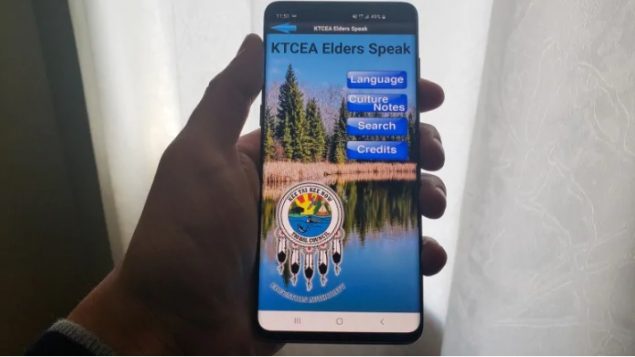A new app will help younger members of Cree First Nations bands in northern Alberta maintain their language.
They will be able to listen to more than 150 tribal elders from across five First Nations in the region.
The app, KTCEA Elders Speak, documents Cree as it is spoken in the region northwest of Grand Prairie.
Students will hear 900 Cree words and phrases identifying local plants, wildlife and daily activities.
Each word was recorded by a local elder.
The team that developed the app focused on cultural traditions and activities by asking the elders what they would like their children to know about their way of life and what they would like the world to know about their nation.

“We chose an app to preserve the language so we could hear our elders speak for many years to come,” says Curriculum co-ordinator Audrey Anderson. (Kee Tas Kee Now Tribal Council Education Authority)
It was developed by the Kee Tas Kee Now Tribal Council Education Authority, which oversees six schools within five northern Alberta First Nations: Peerless Trout First Nation, Whitefish Lake First Nation, Loon River First Nation, Lubicon Lake Band and Woodland Cree First Nation.
“The students will hear the voices of their mushums and kookums–their grandparents–that will instil pride in them,” Audrey Anderson, the education authority’s land-based curriculum co-ordinator, told the Edmonton Journal’s Moira Wyton.
Anderson says dialect differences between Nations were taken into account with each nation addressing certain subjects, including, for example, how to prepare fish and moose and other land–based cultural activities.
“And they will be proud of their language.”
The app, which features more than 900 words in 50 categories, as well as access to games and activities, took three years to develop.
It was completed last year, the United Nations’ International Year of Indigenous Language.
“We chose an app to preserve the language so we could hear our elders speak for many years to come,” Anderson told the CBC’s Madeleine Cummings.
With files from CBC (Madeleine Cummings), Edmonton Journal (Moira Wyton)







For reasons beyond our control, and for an undetermined period of time, our comment section is now closed. However, our social networks remain open to your contributions.